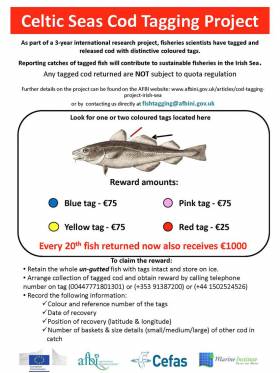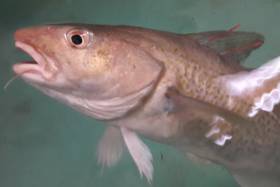Displaying items by tag: Irish Sea Cod
Christmas Bonus In Rewards For Reporting Tagged Irish Sea Cod
#Fishing - Northern Ireland’s Agri-Food and Biosciences Institute reminds that the rewards for reporting tagged Irish Sea cod have been increased.
Earlier this year it was reported that the project would award €25 for every cod captured with a red tag, and €75 for cod with a blue, pink or yellow tag.
But now every 20th fish returned to the Celtic Seas Cod Tagging Project will net an additional €1,000 bonus.
To claim the reward, fishermen must retain the whole un-gutted fish with tags intact and store it on ice.
Collection of tagged cod and the related award can be arrived by calling the number on the tag or contacting +353 91387200 (in ROI) or +44 1502524526 (in UK).
Claimants must also be sure to also record the following details:
- Colour and reference number of the tags.
- Date of recovery.
- Position of recovery (latitude and longitude).
- Number of baskets and size details (small, medium or large) of other cod in the catch.
As previously reported on Afloat.ie, the Irish fishing fleet’s quota for cod and other whitefish will substantially increase for 2018 after a period of sustained recovery.
Rewards For Capture Of Tagged Irish Sea Cod
#IrishSeaCod - The Marine Institute is encouraging the fishing industry and recreational sea anglers alike to report the capture of tagged cod in the Irish Sea and claim a monetary reward.
Tagging cod in the Irish Sea will enable research agencies in the Ireland the UK to develop a better understanding of cod mortality, abundance, distribution and movement patterns within the Irish Sea and surrounding areas.
Emma White from the Fisheries Ecosystem Advisory Service at the Marine Institute said that with a low population of cod in the Irish Sea, it is vital that this stock is investigated.
:A huge effort will be made to tag several thousand cod in the Irish Sea over the next three years,” said White. “Any reports of the tagged cod will provide useful information to help us better understand the current behaviour of the fish and any factors that may have affected the cod stock.
“Our collaboration with science and industry partners is essential to this project, and together we can build our knowledge and share insights to assist in the recovery of this cod stock in the Irish Sea.”
The project will award €25 for cod captured with a red tag, and €75 for cod with a blue, yellow or pink tag. The cod must be stored whole and ungutted on ice, with the tag in place. The date and location (longitude and latitude) of capture, length of the fish, tag colour and its number should also be recorded.
Tagged cod should be reported to Emma White at the Marine Institute at 091 387 200 or [email protected]. The Marine Institute will organise the collection of tagged cod captured in Ireland.
Cod in the Irish Sea have substantially declined in the last decades. Although the European Commission established measures to aid recovery in 2000, the stock has not responded as expected, and the population of cod in the Irish Sea remains low in 2017.
This three-year project is funded by the European Commission and is a partnership between three research agencies: Marine Institute (Ireland), Agri-Food and Biosciences institute (Northern Ireland) and Cefas, the Centre for Environment, Fisheries and Aquaculture Science (United Kingdom).
More information on the Irish Sea Cod Tagging Project can be found HERE.






























































